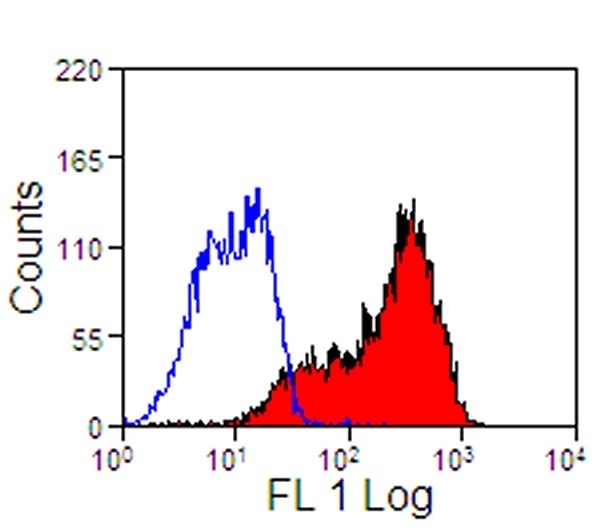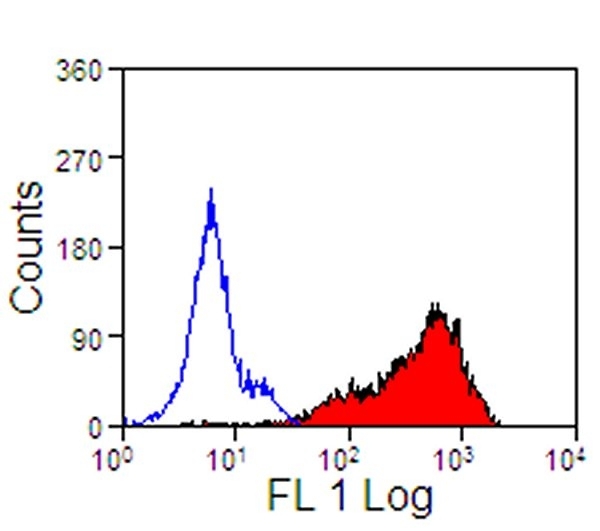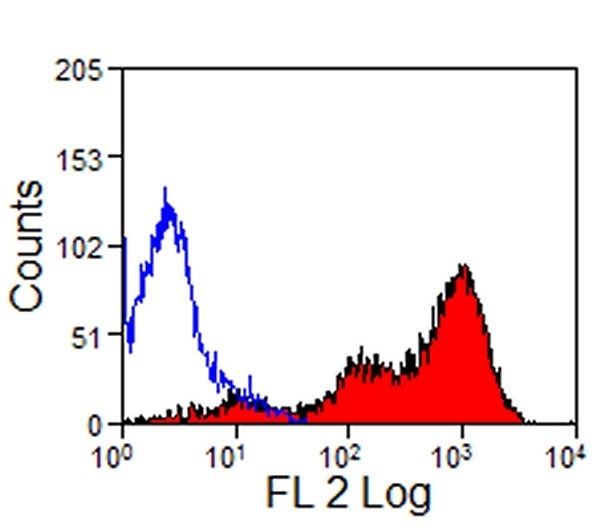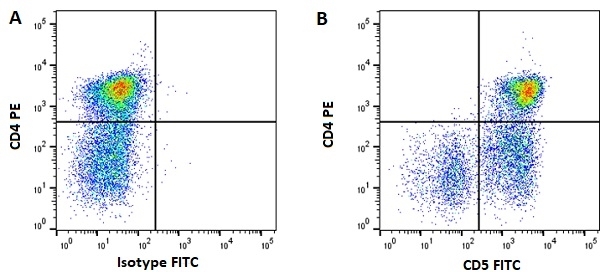CD5 antibody | CVS5




Mouse anti Horse CD5
- Product Type
- Monoclonal Antibody
- Clone
- CVS5
- Isotype
- IgG1
- Specificity
- CD5
| Mouse anti Horse CD5 antibody, clone CVS5 recognizes the equine CD5 antigen, a single-pass type I membrane protein with an approximate molecular weight of 69 kDa. Equine CD5 is expressed on the majority of T-lymphocytes, in addition is has been reported that equine CD5 may also be detected at very low levels on B-cells and granulocyctes. In addition to the CVS5 clone, other CVS clones recognising equine MHC and cell surface antigens are available from Bio-Rad. |
- Target Species
- Horse
- Product Form
- Purified IgG - liquid
- Preparation
- Purified IgG prepared by affinity chromatography on Protein G from tissue culture supernatant
- Buffer Solution
- Phosphate buffered saline
- Preservative Stabilisers
- 0.09% sodium azide (NaN3)
- Carrier Free
- Yes
- Immunogen
- Equine leucocytes.
- Approx. Protein Concentrations
- IgG concentration 1.0 mg/ml
- Fusion Partners
- Spleen cells from immunised Balb/c mice were fused with cells of the mouse X63-Ag8.653 myeloma cell line.
- Regulatory
- For research purposes only
- Guarantee
- 12 months from date of despatch
Avoid repeated freezing and thawing as this may denature the antibody. Storage in frost-free freezers is not recommended.
| Application Name | Verified | Min Dilution | Max Dilution |
|---|---|---|---|
| Flow Cytometry | 1/25 | 1/200 | |
| Immunohistology - Frozen | |||
| Immunoprecipitation |
- Flow Cytometry
- Use 10μl of the suggested working dilution to label 106 cells in 100μl
References for CD5 antibody
-
Lunn, D.P. et al. (1991) Three monoclonal antibodies identifying antigens on all equine T lymphocytes, and two mutually exclusive T-lymphocyte subsets.
Immunology. 74 (2): 251-7. -
Lunn, D.P. et al. (1998) Report of the Second Equine Leucocyte Antigen Workshop, Squaw valley, California, July 1995.
Vet Immunol Immunopathol. 62 (2): 101-43. -
Moyo, N.A. et al. (2013) Differentiation and activation of equine monocyte-derived dendritic cells are not correlated with CD206 or CD83 expression.
Immunology. 139 (4): 472-83. -
Mayall, S. et al. (2001) The anti-human CD21 antibody, BU33, identifies equine B cells.
J Comp Pathol. 124 :83-7. -
Siedek, E. et al. (1997) Isolation and characterisation of equine dendritic cells.
Vet Immunol Immunopathol. 60: 15-31. -
Colbath, A.C. et al. (2017) Autologous and Allogeneic Equine Mesenchymal Stem Cells Exhibit Equivalent Immunomodulatory Properties In Vitro.
Stem Cells Dev. 26 (7): 503-11. -
Ziegler, A. et al. (2016) Equine dendritic cells generated with horse serum have enhanced functionality in comparison to dendritic cells generated with fetal bovine serum.
BMC Vet Res. 12 (1): 254. -
Ziegler, A. et al. (2016) Identification and characterization of equine blood plasmacytoid dendritic cells.
Dev Comp Immunol. 65: 352-7.
View The Latest Product References
-
Ziegler, A. et al. (2022) An allergen-fused dendritic cell-binding peptide enhances in vitro proliferation of equine T-cells and cytokine production.
Vet Immunol Immunopathol. 243: 110351. -
Moyo, N.A. et al. (2023) Equine Arteritis Virus in Monocytic Cells Suppresses Differentiation and Function of Dendritic Cells.
Viruses. 15 (1)Jan 16 [Epub ahead of print].
MCA1079GA
If you cannot find the batch/lot you are looking for please contact our technical support team for assistance.
Please Note: All Products are "FOR RESEARCH PURPOSES ONLY"
View all Anti-Horse ProductsAlways be the first to know.
When we launch new products and resources to help you achieve more in the lab.
Yes, sign me up


